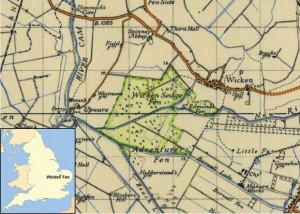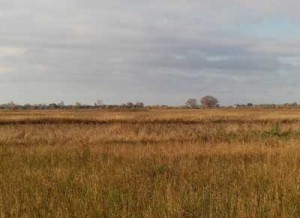Wetlands were once common over a large part of eastern England. Of these so-called fens only two percent survives today and most of it is now situated in nature reserves. One of these reserves is Wicken Fen in Cambridgeshire. It represents a landscape that was once common in the region, combining sedge fens, reed beds and woodland, and was once a major source of food and fuel for local communities. Wicken was one of the very first properties to be bought by the National Trust in 1899. Today Wicken Fen is the focus of a controversial proposal to radically expand the area of managed wetland around the reserve and to return arable land to its former wetland condition. On this podcast we interview Stuart Warrington, Nature Conservation Advisor for the National Trust at Wicken Fen, about these proposed changes and the role of history in recreating the wetlands.

Map of Wicken fen and location.
Source: Ordnance Survey, One-inch
to the mile maps of England and Wales,
New Popular Edition, 1945-1947,
sheet 135.
The second half of the podcast is devoted to a talk delivered by Ian Rotherham of Sheffield Hallam University at a two-day workshop organised by the Histories of Environmental Change Network in November 2010. In his talk Ian analyses the attitudes towards the fens over the centuries and how these influenced the desire to drain thousands of square kilometres of wetland. He also considers the rich wild life in these wetlands and what a rich resources these provided for its inhabitants.
Website mentioned
Histories of Environmental Change
Literature cited
Rod Giblett, Postmodern Wetlands: Culture, History, Ecology (Edinburgh University Press, 1996)
T. C. Smout, Nature Contested: Environmental History in Scotland and Northern England since 1600(Edinburgh University Press, 2000)
Music credit
“Mechanics in Love (Cue 3) flac Stems” by boomaga
Available from ccMixter



Recent Comments